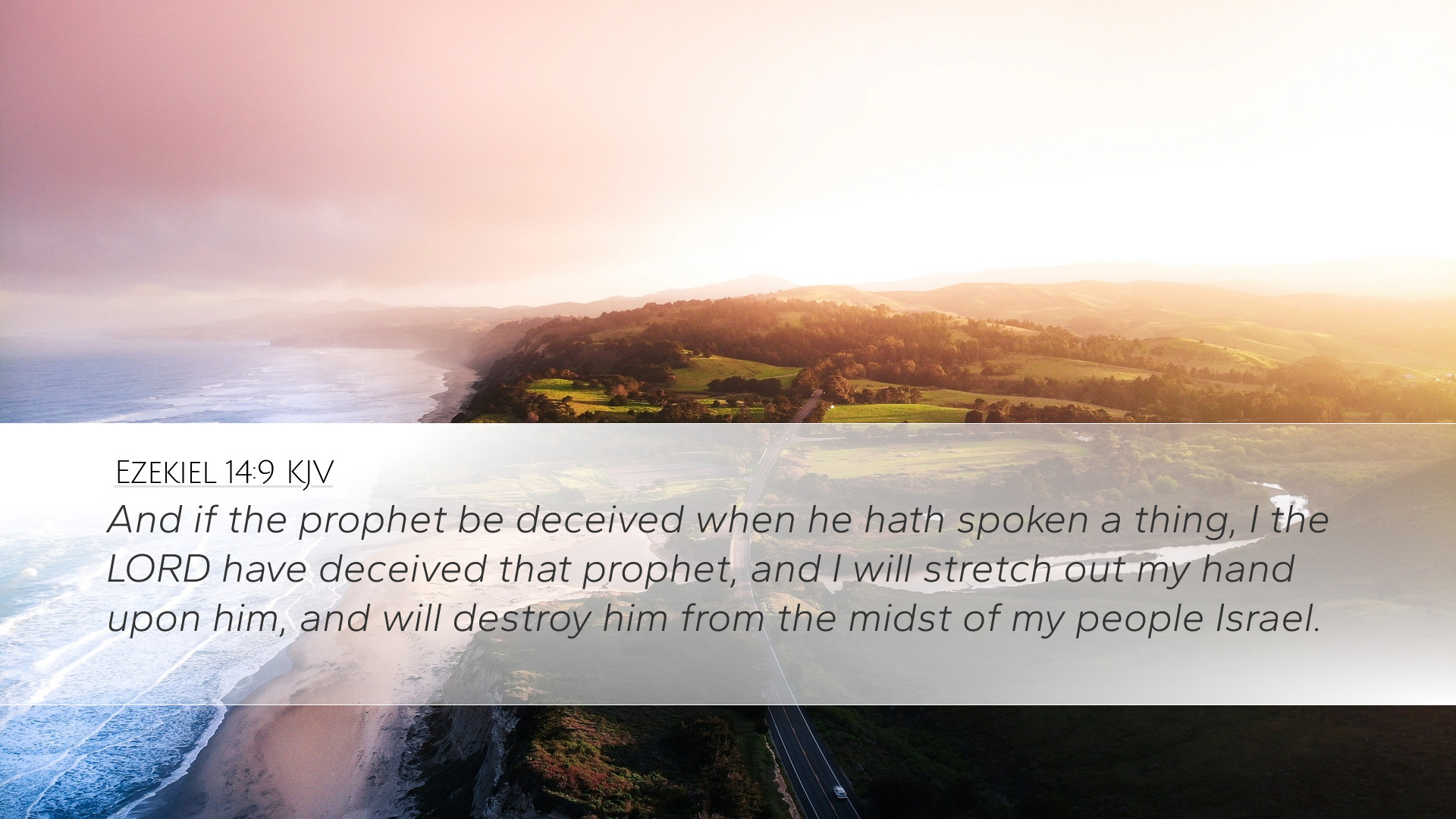Ezekiel 14:9 Commentary Summary
Bible Verse: "And if the prophet be deceived when he hath spoken a thing, I the Lord have deceived that prophet, and I will stretch out my hand upon him, and will destroy him from the midst of my people Israel." (Ezekiel 14:9)
Introduction
The complexities of divine communication and prophecy are encapsulated in Ezekiel 14:9. This verse speaks to the consequences of false prophecy and the sovereignty of God over both the prophets and their messages. The implications of this verse are profound for pastors, students, theologians, and scholars as they reflect on the nature of God’s will and the integrity of spiritual leaders.
The Nature of Prophecy
As Matthew Henry explains, the role of a prophet is to convey divine messages accurately. When a prophet is deceived, it raises questions about the integrity of prophetic utterance. Here, Henry emphasizes the seriousness with which God holds prophets accountable for their messages. The emphasis on "deceived" indicates that the line between divine truth and human error is critical in the prophetic vocation.
The Sovereignty of God
Albert Barnes points out that the phrase "I the Lord have deceived that prophet" illustrates the overarching sovereignty of God. This controversial statement invites deep theological reflection, indicating that God allows certain prophets to mislead, perhaps as a form of divine judgment. Such an idea reinforces the notion of God orchestrating events in accordance with His divine plan, even when human agents act contrary to His will.
Consequences of False Prophecy
Adam Clarke elaborates on the ramifications for the false prophet, focusing on the severe judgment marked by the phrase "I will stretch out my hand upon him." Clarke highlights that this signifies a direct act of God against the prophet, indicating that those who mislead the people will face God’s wrath. This underscores a moral responsibility for prophets to speak truthfully and a warning against complacency in spiritual matters.
Contextual Background
To fully appreciate Ezekiel 14:9, it is essential to consider the historical context of the Israelite community during Ezekiel's time. The people were in exile and struggling with questions about their identity and God's presence. In this setting, false prophets arose, claiming to speak for God while leading the people astray. Understanding this context helps illuminate God's actions described in this verse as part of His broader plan for purification and restoration of Israel.
Theological Implications
- Prophetic Accountability: The verse highlights the importance of accountability among those who claim to speak on behalf of God. This serves as a significant lesson for contemporary leaders to reflect on their messages and ensure they align with divine truth.
- Divine Sovereignty vs. Human Agency: The duality of this verse raises questions about human free will in the face of divine sovereignty. The complexities of God allowing deception while holding individuals accountable evoke deeper theological discussions about the nature of sin and divine judgment.
- Judgment and Restoration: Amidst the discussion of judgment, there is an implicit hope for restoration. God's actions against false prophets serve to eventually purify the community and guide them toward true understanding and relationship with Him.
Reflections for Pastors and Leaders
This passage provides a sobering reminder for pastors and church leaders of the gravity of their role. The responsibility to speak truthfully and lead with integrity is paramount to fulfilling their calling.
Further, it encourages theological reflection on the nature of God’s plans and purposes. Leaders are called to trust in God’s sovereignty even when circumstances are dire, recognizing that His ways are higher than ours.
Conclusion
Ezekiel 14:9 serves as a powerful reminder of the importance of truth in prophetic ministries and the divine accountability that accompanies such roles. The blending of God’s sovereignty with the reality of human error invites deep contemplation and serious application for today's church leaders and scholars alike. As we navigate the complexities of faith and interpretation, may we hold fast to the truth of God’s Word, ensuring that our engagement with His message remains sincere and righteous.


